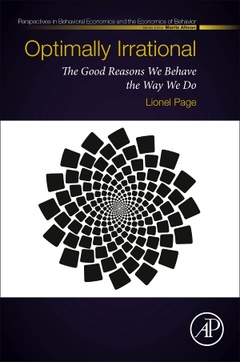Optimally Irrational The Hidden Benefits of Bad Instincts Perspectives in Behavioral Economics and the Economics of Behavior Series
Auteur : Page Lionel

Optimally Irrational: The Hidden Benefits of Bad Instincts evaluates the role of bias in human economic behavior. It shows how the different biases unveiled by behavioral economics make sense as answers to optimization problems when the problems facing human beings are well posed. The work considers the human decision-making processes as the product of a natural selection, which has tuned them to maximize fitness. It explores why we behave the way we do and why many of our biases are actually adaptive solutions to the practical problems people face in the real world. It encompasses insights from evolutionary approaches, cognitive psychology, and game theory to build a unifying framework for behavioral economics and the natural sciences of behavior.
A key reference work in a rapidly expanding field, Optimally Irrational: The Hidden Benefits of Bad Instincts provides economists, social scientists, and researchers in behavioral economics who are interested in decision-making and microeconomics with a clear view of its step forward to the frontier of research in economics and other behavioral sciences, including how the different biases unveiled by behavioral economics make sense as answers to optimization problems when the problems facing human being are well posed.
- Discusses how to think about and adopt apparently irrational behaviors and biases in empirical research
- Explains how biases may be adaptive solutions to well-posed optimization problems under constraints
- Unites advances in behavioral economics with those from other behavioural sciences, and evolutionary biology
I Setting the scene 1. The homo economicus model 2. The psychology of biases in human behaviour 3. The logic of a scientific revolution in economics 4. Evolution and the logic of optimisation
II Individual decisions 5. Heuristics and biases 6. Reference dependent preferences 7. Sensitivity to probability 8. Random utility 9. Time preferences
III Strategic interactions 10. Kindness and reciprocity 11. Emotions and commitment 12. Trust and reputation 13. Selection of delusion
- Discusses how we think about, and adopt, apparently irrational behaviors and biases in empirical research
- Explains how biases may be adaptive solutions to well-posed optimization problems under constraints
- Unites advances in behavioral economics with those from other behavioral sciences and evolutionary biology
Date de parution : 06-2021
Ouvrage de 432 p.
15.2x22.8 cm
Disponible chez l'éditeur (délai d'approvisionnement : 14 jours).
Prix indicatif 145,45 €
Ajouter au panier


